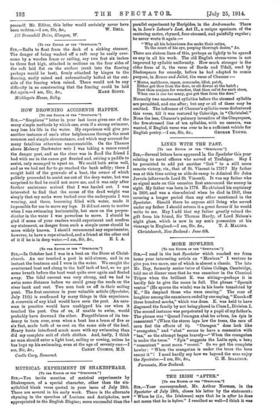MORE HOWLERS.
[To THE EDTTOR OF TIM "SPECTAT0R.".1 Sra,—I read in the last Spectator which reached me from home your interesting article on "Howlers." I venture to give you two more, one of which is almost a classic. The late Mr. Day, formerly senior tutor of Caine College, Cambridge, told me at dinner once that he was examiner in the Classical Tripos when the brilliant K. was sitting—perhaps it is hardly fair to give the name in full. The phrase " Spernit ventos " (He spurns the winds) was in his haste translated by K., "He despised those who were coming." The roar of laughter among the examiners ended by one saying, "Knock off three hundred marks," which was done. K. was held to have disgraced the family by not being placed in Class I.,Division I. The second instance was perpetrated by a pupil of my father's. The phrase was " Quand l'ouragan abat lee arbres, lee epis le ressentent " (When the storm lays low the trees, the ears of corn feel the effects of it). "Ouragan" does look like "orangutan," and "abat" seems to have a connexion with "bas," so the attempt began bravely—" When the orangutan is under the trees." " Epis " suggests the Latin apis, a bee; " ressentent " must mean "resent." So we get the complete howler : "When the orangutan is under the trees the bees resent it"! I need hardly say how we beyond the seaa enjoy






































 Previous page
Previous page